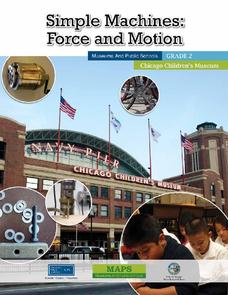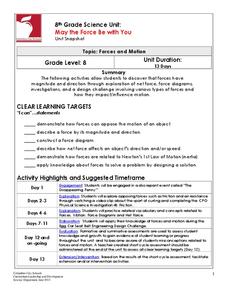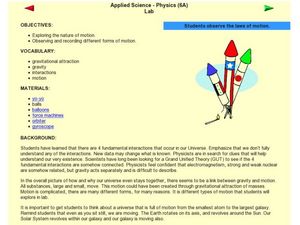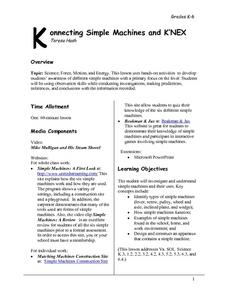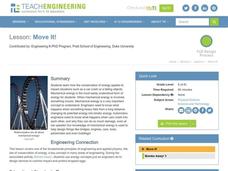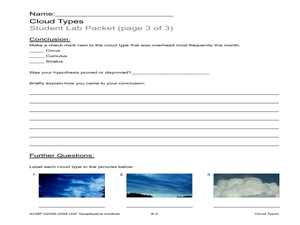Chicago Children's Museum
Simple Machines: Force and Motion
Get things moving with this elementary science unit on simple machines. Through a series of nine lessons including teacher demonstrations, hands-on activities, and science experiments, young scientists learn about forces, motion,...
Curated OER
On The Go! Forces and Motion
Students create a car using physics. In this forces and motion lesson plan, students create a car and test which changes in design change the performance of the car. Students complete a graphic organizer with the different...
Broward County Public Schools
Force and Motion
Get the ball rolling with this upper-elementary science unit on forces and motion. Offering over three weeks of physical science lessons, this resource is a great way to engage the class in learning about simple machines, friction,...
Columbus City Schools
May the Force Be with You
You won't have to force your classes to complete these engaging activities! Through exploration, young scientists learn that force has both magnitude and direction. They draw force diagrams, investigate force models, and complete a...
Curated OER
Move It!!!
Students explore motion by observing the movement of people and duplicating those movements. They compare and contrast various kinds of movements and identify different types of movements in pictures. They build an object that can be...
NASA
Soda Straw Rockets
Three, two, one, blast off to a better understanding of force and motion with this exciting science lesson! Beginning with a discussion about rockets and gravity, young scientists go on to complete a series of worksheets about net...
Curated OER
Force and Motion Flip Books
Fourth graders identify six simple machines in real world examples, distinguish between the three different types of levers and explain Newton's three laws of motion. They create a multimedia presentation over the information they've...
Curated OER
Force and Motion
Students experiment with force and motion. In this force and motion lesson, students test gravity using a variety of objects. Students rotate through a series of stations which use force, motion, friction, and inclines. Students predict...
Curated OER
Rules of Force and Motion
Students view a video and complete experiments with force and motion. In this force and motion lesson, students examine small pieces and how they affect the motion of a toy car. Students also experiment with sand paper,...
Curated OER
Constructive and Destructive forces
Students explore constructive and destructive forces. In this constructive and destructive forces instructional activity, students complete a WebQuest. Students explore the different types of forces and their effect on the surrounding...
Cornell University
Bridge Building
Bridge the gaps in your knowledge of bridges. Individuals learn about bridge types by building models. The activity introduces beam bridges, arch bridges, truss bridges, and suspension bridges.
Curated OER
Forces and Graphing
Middle schoolers analyze graphs to determine relationships between variables and rates of change. They determine the basic concepts about static reaction forces. They determine the slope and equation of a line.
Curated OER
Forces and Movement
Students examine types of forces and movements. They identify different causes that can affect movement and speed. They create their own predictions about they believe to be the outcome of an experiment.
National Nanotechnology Infrastructure Network
Understanding Wave Motion - Slinky vs. Snaky: Which Spring is Dominant?
Ride the wave to an understanding of refraction! The first in a series of two inquiry-based lessons challenges learners to create transverse waves with two different types of springs. As their wave hits an object, they observe the change...
Concord Consortium
Intermolecular Attractions and Boiling Point
Why do different substances have different boiling points? Through an interactive lesson, learners explore how intermolecular attractions affect boiling points. They interact with molecules through an animation and make conclusions about...
Curated OER
Motion Experiment
Learners experiment with the laws of motion. In this motion instructional activity, students explore Newton's Laws of Motion. Learners work in groups experimenting with different objects and observing different types of motion.
Curated OER
Konnecting Simple Machines and K'Nex
Learners study and identify different types of simple machines and how they work. They design a simple machine.
Curated OER
Creating Magnetic Forces
Students discover magnetic forces. In this magnetic experiment lesson plan, students explore magnetism. Students conduct experiments and discover magnetic poles and magnetic strength.
Curated OER
Tornado!: Types and Formation
Students discuss the different types of tornadoes and how they form. Working in groups, they record journal entries by conducting experiments with water bottles simulating vortex formation.
Curated OER
Move It!
Students observe a demonstration presented by the teacher covering different types of energy. They participate in an experiment where they study numerous physics vocabulary words and visit websites that demonstrate examples of these...
Curated OER
What Can We Lose? What Do We Lose as we Gain Force With A Lever?
Third graders view a demonstration of a teeter totter as a basis for assessing pre-knowledge of a lever. They create a KwL chart. Students work in small groups to conduct a variety of experiments. The first requires students to tie books...
Curated OER
Cloud Types
Students examine cloud types. In this cloud lesson, students identify cloud types, observe clouds and collect data, and analyze data to identify the most common cloud they observe overhead during the course of a month.
Teach Engineering
Bridging the Gaps
The London Bridge should not have fallen down. And here's why. After a brief history of bridges and the three main types, class members are introduce to the concepts of tension and compression, the two main forces acting upon bridges.
Cornell University
Mechanical Properties of Gummy Worms
Learners won't have to squirm when asked the facts after completing an intriguing lab investigation! Hook young scholars on science by challenging them to verify Hooke's Law using a gummy worm. Measuring the length of the worm as they...
